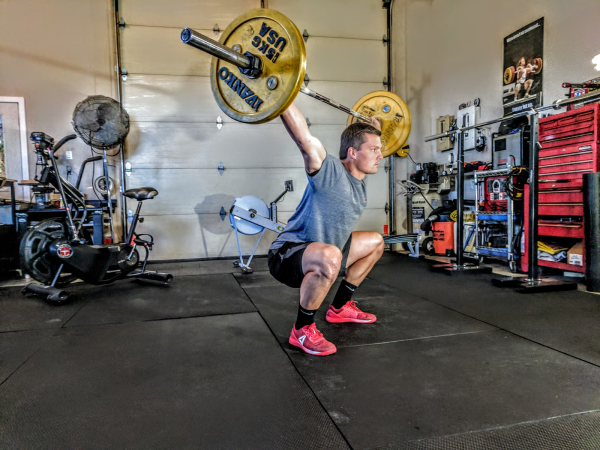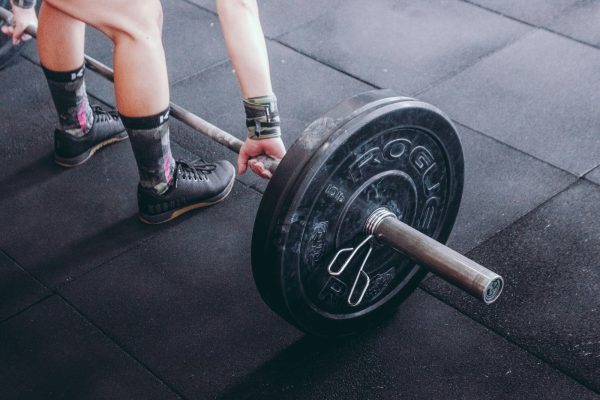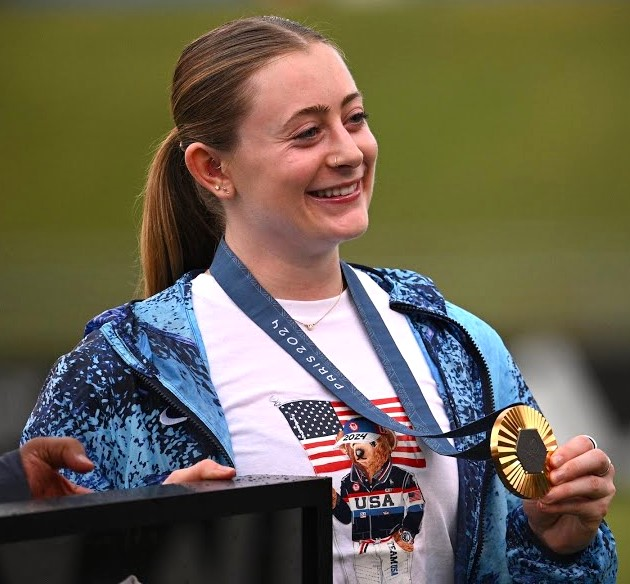Everyone is staring at the platform. Olivia Reeves walks out on stage, facing thousands of fans and an entire row of judges. The pressure of the country is on her shoulders. And yet, through all of the nerves and worries, she is the image of confidence. Taking a deep breath, she pulls the weight upwards; this is her chance to prove herself.
Who is Olivia Reeves?
Olivia Reeves is a current Olympic weightlifter under the 71 kg body weight class – lifters are divided into several categories based on body weight. At just the age of 21, Reeves has fifteen American records under her belt across the youth, junior, and senior age groups (categories that lifters are placed into based on their age) and eight gold medals for the U.S.A. Reeves has managed to maintain a spot on the podium for seven consecutive international competitions, including the Olympics.
Olympic Weightlifting in a Nutshell
Olympic weightlifting is not exactly what you would expect. It is completely different from powerlifting, where athletes are scored based on the amount of weight carried in three exercises: squat, deadlift, and bench. However, only scoring is similar to that of Olympic weightlifting; the difference is the exercises performed.
The two exercises featured in Olympic weightlifting are the snatch and the clean and jerk. Each exercise is unique, and focuses on a particular technique. The goal of the Snatch is to get the weight up as fast as possible in one singular motion, whereas the clean and jerk incorporates two different motions. The clean and jerk requires the athlete to pull the weight up to their shoulders, then push it overhead in a fast ‘jerk.’ Lifters are given three attempts for both the snatch and clean and jerk.

Once the athlete holds the bar overhead, a down indicator will be called, which signals the athlete to let the bar drop. In front of the athlete is a panel of at least three judges. Each judge will either press a white or red light. White indicates a ‘good lift’ while red represents ‘no lift.’ Based on the majority vote, a good lift will be added onto the lifter’s total amount of weight lifted.
Weightlifters are separated into different categories based on their body weight, often called weight classes. This makes the competition fair, as everyone is competing with others in a similar body weight. The Women’s Weight classes, according to the IWF (International Weightlifting Federation – the governing body of Olympic weightlifting over the globe) are: 45 kg, 49 kg, 55 kg, 59 kg, 64 kg, 71 kg, 76 kg, 81 kg, 87 kg, and 87+ kg.
The Beginnings of the Rising Lifter
Olivia Reeves’ accomplishments are extraordinary for her age. While Olympians spend years attempting to break records, she has done it all at her prime. How does Reeves do this?
Olivia Reeves, born in Chattanooga, Tennessee, began weightlifting at just 12 years old, frequently visiting the CrossFit gym her parents owned. However, CrossFit did not suit Olivia’s taste – fortunately, during her time at the gym she discovered her affinity and talent for lifting weights. Soon enough, Olympic weightlifting became more than just an interesting hobby for Reeves.
From joining her first local weightlifting meet to winning national competitions, Olivia Reeves demonstrated sensational potential in the sport. Soon enough, Reeves participated in her first international weightlifting competition at the 2019: IWF (International Weightlifting Federation) Youth World Championships. At 16 years old, she won 2nd place in the 71 kg Category. Starting off strong, she snatched a remarkable 84 kg, and clean and jerked 110 kg. This competition marked only the beginning of her bright future in the weightlifting industry.
Reeves continued to power her way onto the podiums of International Weightlifting Competitions across the globe. During the COVID-19 pandemic, she went on to secure 1st at the 2021 IWF Junior World Championships, 2020 Pan-American Junior Championships, and the Junior Pan American Games. As a junior, ages 17-20, Reeves kept her place on the podium and demonstrated her dominance in the 71 kg Women’s Junior category.
Olympic Status
Olivia Reeves makes her Olympic debut as a fierce competitor. In late March, at the 2024 IWF World Cup (Paris 2024 Qualification Event), she was able to lift a remarkable total of 268 kg. She successfully lifted all six of her attempts – both snatches and clean and jerks – and set three new American world records. Her world record snatch of 118 kg and clean and jerk of 150 kg brought her to the podium with a gold medal. At USAW (USA Weightlifting) National Championships held in June of 2024, she set new senior American records for her weight class. She successfully snatched 120 kg and 151 kg in the clean and jerk. These are the highest numbers recorded under Reeve’s competition records. Gradually, she rose up the ranks to maintain the number two sport in the world in the 71 kg category.
This allowed Reeves to qualify for the Paris 2024 Summer Olympics in the 71 kg category. At Paris, she maintained her streak of excellence and won the Olympic gold medal. She totaled 5 kg above the runner-up with a remarkable final total of 262 kg (578 lbs). She also broke the past Olympic snatch record of 116 kg with her 117 kg attempt.
The Secret Behind Gold
Through consistent training, Reeves was able to shock the world. However, she did not reach all of these accomplishments herself– the driving force behind Reeves is her coach. Steve Fauer has been Olivia Reeves’ coach since she started Olympic weightlifting in 2015. He has been through it all for the past nine years. A former Strength and Conditioning Specialist at the University of Nebraska and Vanderbilt, Fauer began coaching Olympic weightlifting privately. Today, he owns Tennessee Speed and Strength, where Olivia Reeves currently trains.
However, what is the key to success for an Olympian? Everyone says practice makes perfect, but does it really? Just like other world-class athletes, repetition is a key component in Reeves’ training. Strength is not the only characteristic of Olympic weightlifting. It requires flexibility, great mobility, and hundreds of hours handling a barbell. Through constant practice, an athlete is able to develop ‘perfect’ technique.
“Anyone can be a freak of nature and be an amazing talent, but the lifter who sees progressing results is the one that comes to training every day,” said Grace Wang ’25.
Other than years of practice and sweating, what sets Reeves apart from the rest is her training program. It was often believed that greater time spent practicing would result in better performance; however, she disproved this public belief. Compared to other Olympic weightlifting Olympians, Reeves’ lesser time spent training contributed to her outstanding performance in the long-run.
Fauer prepared Reeves’ training schedule to allocate more time for resting and less for actual lifting. Fauer used to follow former Olympian Dragomir Cirosolan’s advice (bronze medal winner in 1984), who believed in at least 6-9 training sessions each week. In a 2024 interview with Simpli Faster, Fauer said, “I found I can get more reps at 90% and above if I take the training frequency down to 3 or 4 times per week.” Through less time training, she is able to maximize the majority of her reps to match a similar intensity level at competitions. As a result, Reeves is able to squat triple her body weight (218 kg at 71 kg body weight).

Her training program primarily emphasizes rest for maximal growth in power and strength, while also decreasing injuries. “Strength is built from fewer heavy sets, and hypertrophy is built from more moderate-to-light sets. In a sport for weightlifting where weight classes are fixed, your inherent goal is not to build more muscle, but rather imbue your current muscle with explosiveness and strength,” said Wang. There must be a balance between working until failure and obtaining adequate rest for peak performance.
“I admire how this method emphasizes quality over quantity. It ensures that each session is impactful and technique isn’t compromised,” said Jennifer Chacon Herrador, a current Olympic-style weightlifter at Long Island Weightlifting Club.
Into the History Books
Olivia Reeves made history as the first American in 24 years to win a Gold Olympic medal for Olympic weightlifting. Not only is Reeves representing America in an Asian dominated playing field, but she is also continuously writing history with her accomplishments.
From starting lifting light weights at the age of 12, Reeves is now able to lift over double her bodyweight overhead. Her accumulated medals do not only represent her success and dominance over the globe, they are reminders of the years and hours of training, practicing, and lifting required to be where she is today. As Wang said, “Rest, lift, and repeat.”
As an inspirational figure for the aspiring youth athletes, Reeves has earned the key to the City of Chattanooga. She has been presented with the highest honor and gratitude by the mayor and chancellor for her service and achievements. A celebrity in her hometown, Reeves even received her own celebratory day: August 9th is now officially declared as Olivia Reeves Day in Chattanooga, Tennessee.
There is also another side of Olivia Reeves that we often neglect. Alongside her remarkable accomplishments and medals, she is a college student pursuing a bachelor’s degree in sociology at the University of Tennessee, Chattanooga. She is able to maintain weightlifting at the Olympic level while also managing college and her social life. She is a normal person – like the rest of us – with an extraordinary passion to share with the world. Reeves’ success represents the power of dedication and perseverance against the weights of the sport and life itself.
“Olivia Reeves is an inspiration for many young lifters and athletes because of her discipline, focus, and ability to excel at a young age,” said Chacon Herrador.
There is so much more to come in Olivia Reeves’ future. It is expected that Reeves will remain at the top of the podium in the upcoming years and continue to dominate the Women’s 71 kg category.
“Anyone can be a freak of nature and be an amazing talent, but the lifter who sees progressing results is the one that comes to training every day,” said Grace Wang.

